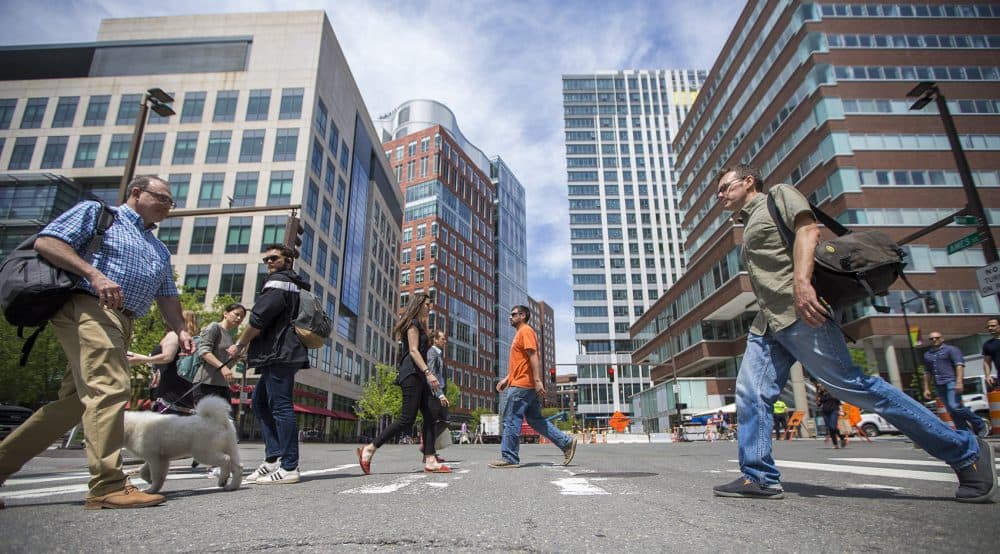Advertisement
How Mass. won the competition to host a 'NASA for health care'

Editor's Note: An excerpt of this story ran in WBUR's weekly health newsletter, CommonHealth. If you like what you read and want it in your inbox, sign up here.
Earlier this year, a group of public officials, scientists, business leaders and community advocates held a secret meeting in Cambridge.
Federal officials were in town, and this group of local leaders was on a mission. They had just a few hours to convince the feds to choose Massachusetts as a hub for the Advanced Research Projects Agency for Health, or ARPA-H — a new federal initiative to invest in solving big and complex health problems.
The pitch they crafted included the state's track record for medical innovation in everything from anesthesia and surgery to COVID vaccines. It was delivered directly by Gov. Maura Healey, researchers, investors and others.
Last week, we learned this aggressive strategy paid off. Massachusetts — and specifically, Cambridge’s Kendall Square — will become one of three hubs for ARPA-H.
This area is already recognized nationally as a hotbed of life sciences research. Massachusetts hospitals, universities and other research centers received nearly $3.3 billion in funding from the National Institutes of Health last year, the highest per capita in the nation, and investors poured $8.7 billion into local biopharma companies, according to the trade group MassBio.
But there was fierce national competition to host ARPA-H, and it wasn’t obvious that Massachusetts would win, according to several people involved with the state’s bid.
When the decision came, Brian Johnson, president of the Massachusetts Medical Device Industry Council, or MassMEDIC, said he felt like the state had landed the headquarters “of what's essentially NASA for health care.”
Johnson was among a handful of business leaders and state officials — they called themselves the "tiger team" — who worked to win this designation. First, in April, they wrote up a detailed pitch. Then they learned ARPA-H officials wanted to meet in person, and they had just a few days to plan a site visit, in May, that they hoped would seal the deal.
The meeting began at LabCentral, a shared lab space for startups, and continued at the Broad Institute of MIT and Harvard.
The argument, according to Johnson, went like this: “We said Massachusetts has proven time and time again that we have the ability to take early-stage concepts of innovation and commercialize them into global health care solutions.
“There is no better place in the world than Kendall Square to house this, because you basically can't walk down the street without bumping into some place or some person who invented some major health care breakthrough.”
Johnson and others involved in this effort said they weren’t allowed to discuss it publicly until now — or Massachusetts risked being disqualified. For a stretch, the team worked seven days a week, with twice-daily calls, to try to win the bid.
“I think we all felt like losing was probably not an option for us,” Johnson said.
So, why was it so important to win this bid?
The answer has to do with the lofty ambition of ARPA-H. The agency is hiring program managers to distribute big chunks of federal funding to researchers who take on big challenges, from treating cancer and dementia, to making health care more equitable.
Program managers will be based in Cambridge. So they will be able to see up close the work going on in research labs there and across the state.
“This is like thinking about trying to put a man on the moon,” said Massachusetts Secretary of Economic Development Yvonne Hao. “This is a very ambitious, inspirational project, and it's going to be headquartered here — which means that if you're someone who wants to think about these problems and work on these problems, you're going to be in Massachusetts.”
ARPA-H, which had a budget of $1.5 billion in the last fiscal year, has already launched projects to discover new antibiotics, 3D-print a human heart and help the body repair its own joints.
The agency is expected to dole out hefty sums in the months and years ahead.
“We have the hospitals and health systems that are incredibly well-positioned, and doing cutting-edge research, to apply for that funding,” said Valerie Fleishman, chief innovation officer at the Massachusetts Health & Hospital Association.
It’s unclear how much research funding ARPA-H will distribute locally, or how many new jobs will be based in the state. (Agency officials say staffing will be “lean.”) But that isn’t tempering the excitement of local executives and elected officials.
“This is a once-in-a-lifetime opportunity,” said Fleishman, a member of the team that worked to win over federal officials.
One reason for the optimism: ARPA-H is designed to follow the model of DARPA, or the Defense Advanced Research Projects Agency. That agency spawned the internet, among other technological advances.
“We have this proven model, demonstrated over all these decades, and we're applying it to health care,” said Chris Coburn, chief innovation officer at Mass General Brigham, who also worked on the state’s bid.
“The DARPA and ARPA-H model is about reinvention and disrupting the old approaches,” he said.
Instead of researchers generating ideas and asking the government for funding, these agencies use a different approach. Project managers pose big questions, then distribute funds to researchers who try to answer them.
This means ARPA-H is likely to fund work that otherwise wouldn't happen, because it doesn't qualify for venture funding or NIH grants, Coburn said.
“There are so many challenges in contemporary health care that are unmet, unaddressed, because of the structural elements of how innovation occurs,” he said.
Cambridge will host ARPA-H's investor catalyst hub, which will focus on translating ideas into solutions, federal officials said. VentureWell, a Hadley-based nonprofit, will manage the hub.
Craig Gravitz, director of ARPA-H’s Project Accelerator Transition Innovation Office, said Cambridge was selected in part for its ability to build connections with researchers, entrepreneurs and investors nationwide.
“The hubs are important and serve as a center of gravity,” Gravitz said in an emailed statement, “though just as important are the relationships they have now and ones they can build by working collaboratively around the country.”
Dallas will host a second hub focused on customer experience of health care, including diversity of clinical trials. A third administrative hub will be based in the Washington D.C. area.
“It really is validation,” said Ed Coppinger, head of government affairs at MassBio, “that Massachusetts is the epicenter of bio in the country, if not the world.”
This article was originally published on October 05, 2023.
